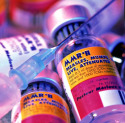
 St James AME Church, Elgin, Illinois
St James AME Church, Elgin, Illinois
 Why should my child get the MMR shot?
Why should my child get the MMR shot?
Posted on Wed, Feb 11, 2015
February 11, 2015
The best way to protect against measles is to get the measles-mumps-rubella shot (called the MMR shot). Doctors recommend that all children get the MMR shot.
Why should my child get the MMR shot?
The MMR shot:
· Protects your child from measles, a potentially serious disease (and also protects against mumps and rubella)
· Prevents your child from getting an uncomfortable rash and high fever from measles
· Keeps your child from missing school or childcare (and keeps you from missing work to care for your sick child)
Is the MMR shot safe?
Yes. The MMR shot is very safe, and it is effective at preventing measles (as well as mumps and rubella). Vaccines, like any medicine, can have side effects. But most children who get the MMR shot have no side effects.
What are the side effects?
Most children do not have any side effects from the shot. The side effects that do occur are usually very mild, such as a fever or rash. More serious side effects are rare. These may include high fever that could cause a seizure (in about 1 person out of every 3,000 who get the shot) and temporary pain and stiffness in joints (mostly in teens and adults).
Is there a link between the MMR shot and autism?
No. Scientists in the United States and other countries have carefully studied the MMR shot. None has found a link between autism and the MMR shot.
What is measles?
Measles is a serious respiratory disease (in the lungs and breathing tubes) that causes a rash and fever. It is very contagious. In rare cases, it can be deadly.
What are the symptoms of measles?
Measles starts with a fever that can get very high. Some of the other symptoms that may occur are:
· Cough, runny nose, and red eyes
· Rash of tiny, red spots that start at the head and spread to the rest of the body
· Diarrhea
· Ear infection
Is it serious?
Measles can be dangerous, especially for babies and young children. From 2001-2013, 28% of children younger than 5 years old who had measles had to be treated in the hospital.
For some children, measles can lead to:
· Pneumonia (a serious lung infection)
· Lifelong brain damage
· Deafness
· Death
How does measles spread?
Measles spreads when a person infected with the measles virus breathes, coughs, or sneezes. It is very contagious. You can catch measles just by being in a room where a person with measles has been, up to 2 hours after that person is gone. And you can catch measles from an infected person even before they have a measles rash. Almost everyone who has not had the MMR shot will get measles if they are exposed to the measles virus.
Where do measles cases in the United States come from?
Measles disease can come into this country when unvaccinated U.S. residents travel internationally or foreign visitors to the United States are exposed to measles in another country and travel into the United States. The risk of getting measles may be very high for unvaccinated U.S. residents who travel abroad. The reason for this high risk is because measles is common in other parts of the world, including countries in Europe, Asia, the Pacific, and Africa. Worldwide, about 20 million people get measles each year. When people with measles travel into the United States, they can spread the disease to unvaccinated people including children too young to be vaccinated.
No messages have been posted.
You must first create an account to post.
